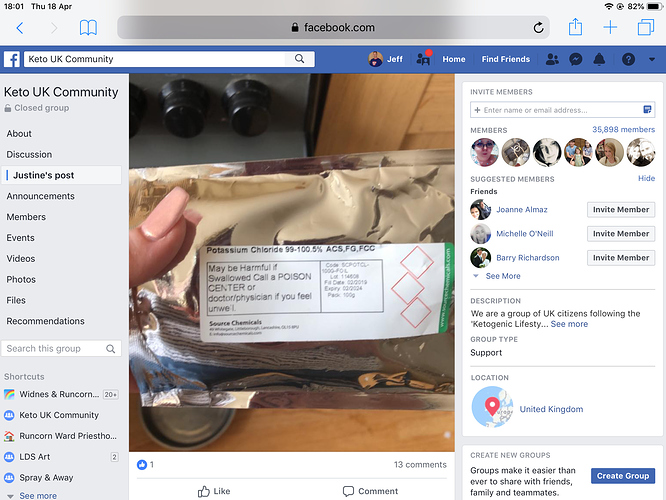I asked this question on a Facebook forum, didn’t get the answer. Just told to read the pinned post which told how much electrolytes to consume, but not why I should take them, and what the benefits are. I just need to know why we should take them, and can keto succeed without them. Sorry if I sound dumb.
Why are electrolytes so important?
You don’t sound dumb at all. Eating ketogenically means the kidneys excrete more sodium. This includes potassium and magnesium. Therefore to keep things in balance, a lot of folks need to add more of these to their diet.
Hey Jeff,
Not sure if this would be of interest but you might find this at least a place to start… and Dr. Berry isn’t trying to sell anything. 
Once you are adapted and your body has adjusted to this way of eating, it’s quite possible that you wouldn’t need any supplements. Salting your food to taste and eating foods that contain macronutrients and vitamins and minerals (meats, veggies) can be enough.
But, early on, it takes our bodies some time to adjust away from being on a carb heavy diet which results in water retention and as a result salt retention. As already mentioned above by @MooBoom when we are on a ketogenic diet our body flushes these salts out and so we need more than we are used to. Being intentional with it early on helps avoid headaches and cramps and lightheadedness.
I’ve been kicked off a Facebook group for asking too many questions and having an opinion.
People’s needs vary widely. I never needed to supplement heavily. In the first couple of months I had a 1/4 teaspoon of salt before my CrossFit workouts and it did help my stamina significantly, but other than that I was just fine and never got keto flu. After a few months even that was unnecessary.
My husband was the opposite at the start. He was violently ill from keto flu and spent an entire day vomiting until we got his electrolytes sorted out. This happened to him twice in the early days. But after a few months he didn’t need any supplementation either.
I needed to supplement pretty heavily when I started, buy now that I’m adapted I don’t really need to. Every once in a while I’ll feel my muscles trying to get crampy, and I’ll add a little nosalt to my food in addition to my my regular salt, but it’s not like it was in the beginning. I had to drink as much salt and potassium as I could without getting the runs, and I still got cramps fairly often. It was worth it, though. Halfway to my goal weight.
I left a group because I was being bullied for asking questions and not being positive??? Just because I asked how people deal with days that they eat more than 20g carbs!!! The admin told me I was fostering a negative environment. This was like my 3rd keto day and I was just getting started and reading all the info etc. I reported that dude and left the group (after I gave him a piece of my mind).
I got blocked from a Facebook group for telling a skinny girl that, no, skinny people are not treated just as bad by society as fat people.
The high insulin levels cause our kidneys to retain salt. When we lower our carbs and therefore decrease our insulin levels, the kidneys no longer hang on to the sodium. Also, I think most people who switch over to keto, start eating much more real food and home cooked food. These are lower in sodium compared to processed food, so we need to add more sodium because of that.
Magnesium is necessary for everyone, even people not following a keto diet because the environment is depleted of Mg due to modern farming practices. Also, Mg and Ca need to have a balance and most processed foods are supplemented with Ca but not Mg. That can throw our Mg levels out of whack. I don’t think it is as necessary to add extra K if your sodium levels are good and you eat foods rich in potassium.
I’ve been following this diet for almost two years. Supplementing Na and Mg are vital for me. I have to add an extra 1.5 teaspoons of salt via salt water or bouillon every day and I need about 600 mg of Mg a day or I get cramps and heart palpitations.
Everyone is different. You will have to find what you need to do for your own electrolytes. If you exercise a lot you may need more.
I knew, or have been educated on this forum, that our kidneys retain salt on a high carb diet, but I didn’t know it was specifically high insulin causing it. I’m still trying to wrap my head around the various functions of our organs. Anyway, this is interesting, additional info. I need to go search around on this again. I wouldn’t be able to explain to someone why our kidneys retain more water and therefore salt on a high carb diet. Just saying high insulin causes it… I’m at a loss as to why.
Electrolytes maintain the acid-base balance of your blood, form part of the transmission of nerve impulses, and so forth. This is why you need them in their diet, whether you can get enough in your food, or whether you need supplements.
Calcium, while not an electrolyte, is another mineral that your body needs, and it is regulated by the same mechanisms in the body as sodium, potassium, and magnesium.
Most people, as long as they get enough salt, find that the other three minerals stay in balance, just from what they get from their keto diet.

